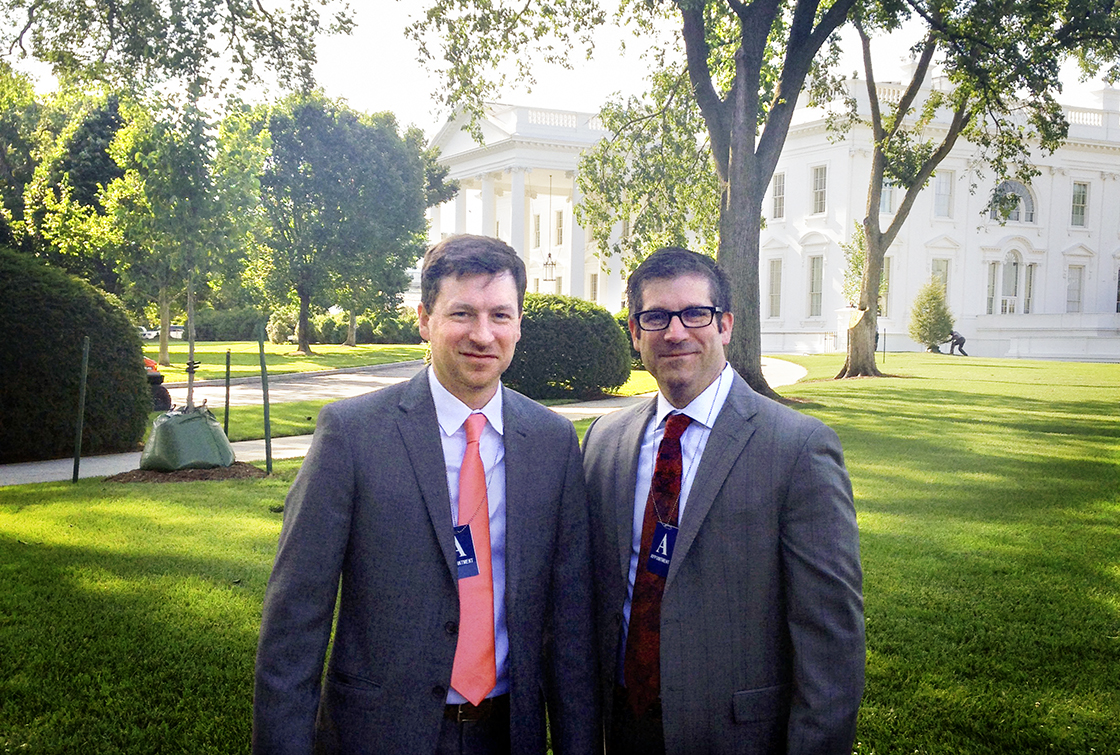Cornell joins White House in pledge for post-prison higher ed
By Susan Kelley
Cornell was among 15 institutions of higher education hosted by the White House June 10 as founding partners launching the Obama administration’s Fair Chance Higher Education Pledge.
The pledge provides colleges and universities with an opportunity to voice their support for reforms to remove unnecessary barriers to college for currently or formerly incarcerated people. In total, 25 institutions have signed the pledge.

At the White House, Rob Scott, executive director of the Cornell Prison Education Program (CPEP), participated in a round-table discussion with Secretary of Education John King; Cecilia Muñoz, director of the White House Domestic Policy Council; and representatives from participating institutions and organizations, many of which offer academic programs in prisons. They talked about the role colleges and universities can play in providing people who have paid their debt to society a fair chance to receive an education and gainful employment.
“The Cornell Prison Education Program has helped hundreds of people access a college education while they are in prison. By signing the pledge, Cornell is saying that these individuals should also be treated fairly when they pursue a college education outside prison walls,” said Scott.
CPEP supports a regional collaboration that brings together Cornell faculty and graduate students who volunteer to teach college-level liberal arts classes to a select group of inmates at three area prisons. Successful students are conferred an associate’s degree from Cayuga Community College, one of CPEP’s partners. So far 30 CPEP students have earned associate degrees.
Each semester about 60 Cornell professors and graduate and undergraduate students teach classes from neuroscience to philosophy, music theory, algebra and more. Fifteen enrolled in the program are on track to graduate this year.
There are 2.2 million Americans behind bars, and more than 600,000 inmates are released each year. An estimated 70 million or more Americans have some sort of criminal record – almost 1 in 5 of all Americans and almost 1 in 3 Americans of working age.
Admissions processes for educational institutions often make it difficult if not impossible for those with criminal records to get an education that can lead to a job.
“That is not the case at Cornell,” Scott said, referring to Cornell’s Fair Chance pledge statement:
“Cornell University was founded on egalitarian principles of providing access to higher education for all academically qualified students and a practical vision of higher education dedicated to a land-grant mission of public service and engagement. Cornell strives to foster diversity in our student populations by seeking, admitting and graduating students from all backgrounds.
“These values are consistent with the Fair Chance Higher Education Pledge that encourages colleges and universities to commit to actions so that all American have the opportunity to succeed through pursuing advanced education. Cornell considers criminal history information of any applicant only in later stages of the admissions process and provides an opportunity for applicants to provide explanatory information. Once admitted, Cornell provides a supportive campus environment.
“We are proud to take action in our own region through the Cornell Prison Education Program, providing academic opportunities for incarcerated students, some of whom have been admitted to Cornell University following their affiliation with that program.”
The White House honored Scott in April as a Champion of Change, along with nine others from around the country, for expanding opportunities for currently or formerly incarcerated people.
Media Contact
Get Cornell news delivered right to your inbox.
Subscribe